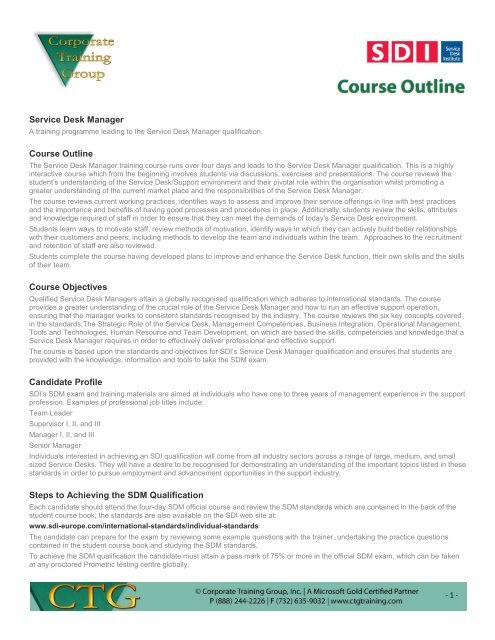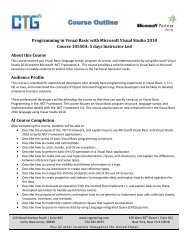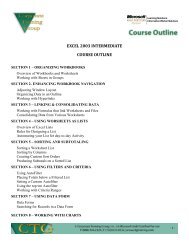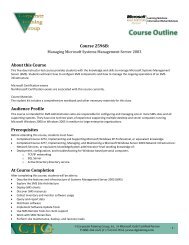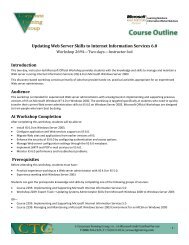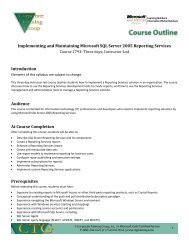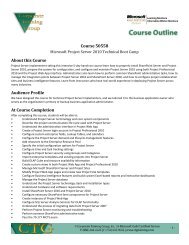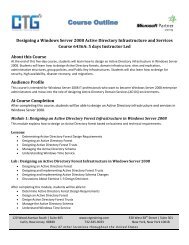Service Desk Manager Course Outline Course Objectives ...
Service Desk Manager Course Outline Course Objectives ...
Service Desk Manager Course Outline Course Objectives ...
You also want an ePaper? Increase the reach of your titles
YUMPU automatically turns print PDFs into web optimized ePapers that Google loves.
<strong>Service</strong> <strong>Desk</strong> <strong>Manager</strong><br />
A training programme leading to the <strong>Service</strong> <strong>Desk</strong> <strong>Manager</strong> qualification.<br />
<strong>Course</strong> <strong>Outline</strong><br />
The <strong>Service</strong> <strong>Desk</strong> <strong>Manager</strong> training course runs over four days and leads to the <strong>Service</strong> <strong>Desk</strong> <strong>Manager</strong> qualification. This is a highly<br />
interactive course which from the beginning involves students via discussions, exercises and presentations. The course reviews the<br />
student’s understanding of the <strong>Service</strong> <strong>Desk</strong>/Support environment and their pivotal role within the organisation whilst promoting a<br />
greater understanding of the current market place and the responsibilities of the <strong>Service</strong> <strong>Desk</strong> <strong>Manager</strong>.<br />
The course reviews current working practices, identifies ways to assess and improve their service offerings in line with best practices<br />
and the importance and benefits of having good processes and procedures in place. Additionally, students review the skills, attributes<br />
and knowledge required of staff in order to ensure that they can meet the demands of today’s <strong>Service</strong> <strong>Desk</strong> environment.<br />
Students learn ways to motivate staff, review methods of motivation, identify ways in which they can actively build better relationships<br />
with their customers and peers; including methods to develop the team and individuals within the team. Approaches to the recruitment<br />
and retention of staff are also reviewed.<br />
Students complete the course having developed plans to improve and enhance the <strong>Service</strong> <strong>Desk</strong> function, their own skills and the skills<br />
of their team.<br />
<strong>Course</strong> <strong>Objectives</strong><br />
Qualified <strong>Service</strong> <strong>Desk</strong> <strong>Manager</strong>s attain a globally recognised qualification which adheres to international standards. The course<br />
provides a greater understanding of the crucial role of the <strong>Service</strong> <strong>Desk</strong> <strong>Manager</strong> and how to run an effective support operation,<br />
ensuring that the manager works to consistent standards recognised by the industry. The course reviews the six key concepts covered<br />
in the standards;The Strategic Role of the <strong>Service</strong> <strong>Desk</strong>, Management Competencies, Business Integration, Operational Management,<br />
Tools and Technologies, Human Resource and Team Development, on which are based the skills, competencies and knowledge that a<br />
<strong>Service</strong> <strong>Desk</strong> <strong>Manager</strong> requires in order to effectively deliver professional and effective support.<br />
The course is based upon the standards and objectives for SDI’s <strong>Service</strong> <strong>Desk</strong> <strong>Manager</strong> qualification and ensures that students are<br />
provided with the knowledge, information and tools to take the SDM exam.<br />
Candidate Profile<br />
SDI’s SDM exam and training materials are aimed at individuals who have one to three years of management experience in the support<br />
profession. Examples of professional job titles include:<br />
Team Leader<br />
Supervisor I, II, and III<br />
<strong>Manager</strong> I, II, and III<br />
Senior <strong>Manager</strong><br />
Individuals interested in achieving an SDI qualification will come from all industry sectors across a range of large, medium, and small<br />
sized <strong>Service</strong> <strong>Desk</strong>s. They will have a desire to be recognised for demonstrating an understanding of the important topics listed in these<br />
standards in order to pursue employment and advancement opportunities in the support industry.<br />
Steps to Achieving the SDM Qualification<br />
Each candidate should attend the four-day SDM official course and review the SDM standards which are contained in the back of the<br />
student course book; the standards are also available on the SDI web site at:<br />
www.sdi-europe.com/international-standards/individual-standards<br />
The candidate can prepare for the exam by reviewing some example questions with the trainer, undertaking the practice questions<br />
contained in the student course book and studying the SDM standards.<br />
To achieve the SDM qualification the candidate must attain a pass mark of 75% or more in the official SDM exam, which can be taken<br />
at any proctored Prometric testing centre globally.<br />
- 1 -
<strong>Course</strong> <strong>Objectives</strong><br />
Defining Strategic Requirements<br />
Understand the role of the <strong>Service</strong> <strong>Desk</strong> within the context<br />
of the organisation's business goals<br />
Identify the key sources of knowledge and best practice for<br />
the support environment<br />
Determine the design and set-up of a successful support<br />
organisation based on proven strategies and known best<br />
practices<br />
Business Integration<br />
<br />
<br />
<br />
<br />
<br />
<br />
<br />
Learn about the key requirements for a strategically<br />
effective <strong>Service</strong> <strong>Desk</strong><br />
Understand the importance of business and IT integration<br />
Understand how to develop clear strategies that<br />
demonstrably integrate with and support those of the<br />
business and that are designed to take advantage of<br />
business opportunities<br />
Understand the importance of and need for goals and<br />
objectives<br />
Understand the importance of ensuring all staff are aware<br />
of the role they play in the business, and why they do it<br />
Determine the type and style of management reporting<br />
that best meets the organisations needs<br />
Determine options for staffing plans<br />
Essential Management Skills<br />
Learn about the key skills an effective <strong>Service</strong> <strong>Desk</strong><br />
<strong>Manager</strong> should demonstrate<br />
Learn about the commercial management of a <strong>Service</strong><br />
<strong>Desk</strong> and the basics of financial management<br />
Recognise the importance of having excellent<br />
communication skills<br />
Understand the key management behaviours required to<br />
enable the <strong>Service</strong> <strong>Desk</strong> to deliver on commitments<br />
<strong>Service</strong> Culture<br />
Recognise and appreciate the importance of<br />
understanding our customers expectations and<br />
perceptions<br />
Understand the benefit of using SLAs effectively as a<br />
service quality improvement tool<br />
Understand the importance of having a reward and<br />
recognition strategy and identify some different methods of<br />
reward and recognition<br />
Implementation Planning<br />
<br />
<br />
<br />
Determine how to develop a project plan to set-up or redesign<br />
the <strong>Service</strong> <strong>Desk</strong><br />
Identify the steps required in a project plan<br />
Develop a template for project plans<br />
Process Management<br />
<br />
<br />
<br />
Understand the importance of having clear and<br />
straightforward processes within the workplace<br />
Understand the importance of root cause analysis<br />
Review the importance and benefit of customer service<br />
process metrics<br />
Operational Processes<br />
Examine the IT <strong>Service</strong> Management processes (ITSM)<br />
processes with which the <strong>Service</strong> <strong>Desk</strong> has greater<br />
contact<br />
Understand the <strong>Service</strong> <strong>Desk</strong>'s responsibility in and<br />
relationship with the ITSM processes of: Incident, Problem,<br />
IT Change, Release and Deployment, <strong>Service</strong> Asset and<br />
Configuration, Risk, Knowledge, Information Security, IT<br />
<strong>Service</strong> Continuity and <strong>Service</strong> Level Management<br />
People and Motivation<br />
Understand the power of effective reward and recognition<br />
strategies<br />
Learn how to successfully address any performance<br />
deficiencies in your team<br />
Recognise what creates motivated staff, and learn how to<br />
address absent motivational factors<br />
Review your work environment factors and their impact on<br />
staff motivation and behaviour<br />
Recruitment, Retention and Development<br />
<br />
<br />
<br />
<br />
Understand important requirements for effective staff<br />
recruitment<br />
Recognise the key qualities, skills and knowledge required<br />
by today's support professional<br />
Identify the core business knowledge all staff should<br />
possess as a minimum<br />
Learn about the importance of a structured approach to<br />
training and development<br />
Quality Assurance<br />
Understand the common QA practices used to assess,<br />
modify, and improve IT services in order to meet and<br />
exceed customer expectations<br />
Understand the role of benchmarking in the <strong>Service</strong> <strong>Desk</strong><br />
environment in order to obtain a comparative evaluation of<br />
the <strong>Service</strong> <strong>Desk</strong>’s performance<br />
Tools and Technologies<br />
Identify the commonly used <strong>Service</strong> <strong>Desk</strong> tools and<br />
technologies, their benefits and pitfalls<br />
Learn about the benefits of ITSM tools<br />
Identify which tools we use, which we need, and why we<br />
need them<br />
Business Mastery<br />
<br />
<br />
Understand the responsibilities of the <strong>Service</strong> <strong>Desk</strong> in<br />
contributing to IT and business objectives<br />
Promote the <strong>Service</strong> <strong>Desk</strong> to ensure it is recognised for its<br />
business benefits<br />
Organisational Leadership<br />
Identify the qualities that make for effective leadership, and<br />
how to gain them<br />
Professional Development<br />
<br />
<br />
Determine how well we manage our time, and develop<br />
methods for improving our time management skills<br />
Understand the importance of continual personal<br />
development, continual learning and of keeping up-to-date<br />
with industry developments<br />
- 2 -


